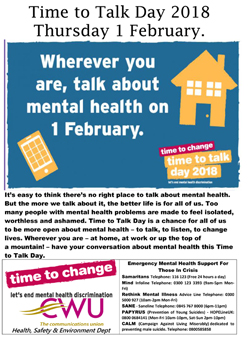Mental health problems affects one in four of us yet people are still afraid to talk about it. For people with mental health problems not being able to talk about it can be one of the worst parts of the illness. So by getting people talking about mental health we can break down stereotypes, improve relationships, aid recovery and take the stigma out of something that affects us all.
Prior to this year's CWU Annual Conference in April, the Union's Health & Safety Department had already recognised, as it has done for many years, thet mental health at work is a Trade Union issue, and a H&S one at that!
 The Department's Head, Dave Joyce issued an LTB to all CWU Branches in which he discussed Time To Talk Day (1st February 2018) used to highlight mental health issues as they affect us at home and at work.
The Department's Head, Dave Joyce issued an LTB to all CWU Branches in which he discussed Time To Talk Day (1st February 2018) used to highlight mental health issues as they affect us at home and at work.
Here is what he had to say in LTB052/18:
Mental health problems can come about from any number of stresses and worries that all of us have at some time or another in our lives. Perhaps it’s relationship problems, homelessness, job stress or money worries. It’s important to recognise when things are getting serious. This is usually when the problem begins to interfere with our ability to cope day to day. It’s also important to remember that, with the right support, most people manage their mental health problems successfully and lead fulfilling lives.
The most common mental health problems include addictions, anxiety, depression, eating disorders. One in four people will experience a mental health problem at some point in their lives. That’s a lot of people. Most of the time, people cope ok and find ways to switch off, chill out and relax. But when things start to take over and get on top of us, it can develop into something we need specialist help with. Everyone has bad days and some of the symptoms of mental health problems may not immediately seem obvious. Take a look at the list below, and if some of the things sound familiar, that you or a friend or colleague has been experiencing for a few weeks or more, something may need to be done:
Problems getting to sleep, or waking up early in the morning and not being able to get back to sleep again.
Feeling really knackered even when you haven’t done much.
Aches and pains for no apparent reason or feeling run down.
Poor appetite.
Not feeling like going out.
Not being interested in the things you used to be.
Feeling anxious and irritable for no real reason, or having difficulty managing your anger and ‘flying off the handle’. Repeatedly getting headaches or migraines.
If you’re concerned about yours or someone else's mental health, contact and talk to your GP or contact one of the groups listed below. If the person concerned wants to talk it over first, give one of the groups listed below a call. The people on the helplines are non-judgemental and will give individuals the chance to explain the way they feel, and give help on what to do next.
Too often, people who experience a mental health problem are also left with the burden to talk about mental health in the wider sense.
 Time to Talk Day encourages everyone to talk about mental health. And this year the organisers propose that Any Place is the Right Place to talk about mental health, whether you are at home, at work or participating in leisure activities. You can talk about mental health at work.
Time to Talk Day encourages everyone to talk about mental health. And this year the organisers propose that Any Place is the Right Place to talk about mental health, whether you are at home, at work or participating in leisure activities. You can talk about mental health at work.
Thursday 1 February is Time to Talk Day – a day when everyone is encouraged to have a conversation about mental health. We know that it benefits all of us to talk about mental health. "Time to Talk Day" is run by "Time to Change" and the aim is to help spread the word that anywhere can be the right place to talk about mental health – including at work.
Time to Change is England’s biggest programme to challenge mental health stigma and discrimination and is run by the charities "Mind" and "Rethink Mental Illness". There are posters and top tips cards giving ideas on how to start conversations. There is also information about how to support colleagues, and where to go if they need support.
It’s great to start the conversation in the workplace and we hope that the campaign materials and ideas help CWU Branches, Health and Safety Reps, Branch and local Reps to do this. Sometimes this can mean that people currently experiencing mental health problems will need some support as sensitive conversations may bring up difficult things.
We would encourage you to highlight the support tools that are currently available from employees, Mental Health Charities, NHS etc. If anyone you know is experiencing mental health problems or needs urgent support, there are lots or places they can go to for help.
"Time to Change" is focusing on changing how we all think and act about mental health. "The Time to Change Employer Pledge" Remember, Royal Mail, BT and Santander are amongst the employers that have signed the 'Pledge with the CWU.
When signing the Time To Change Pledge employers demonstrate their commitment to change how the organisation thinks and acts about mental health in the workplace and pledges to:-
Demonstrate senior level buy-in
Demonstrate accountability and recruit employee champions
Raise awareness
Have policies to address mental health in the workplace
Equip managers to have conversations about mental health
Ask employees to share their personal experiences with mental health problems
Provide information about mental health and signpost to support services
Make sure that employees who are facing these problems get supported and feel supported
Some local managers may need reminding of this commitment so on "Time To Talk Day 2018" as CWU Reps, if nothing else, why not talk to them and inform them or remind them of the pledge on "Time To Talk Day".
Source: CWU